
Question Number 213234 by ajfour last updated on 01/Nov/24
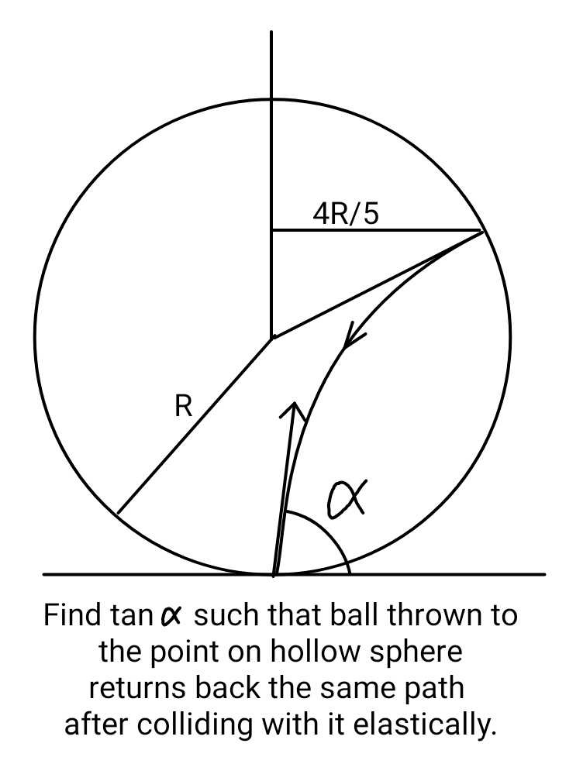
Commented by Ghisom last updated on 01/Nov/24
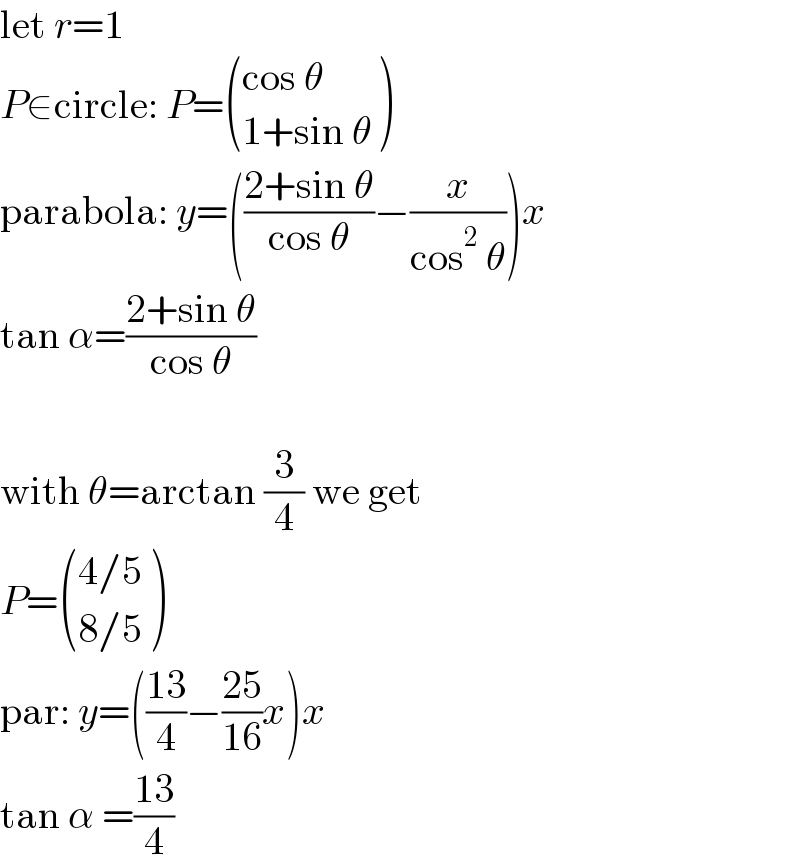
$$\mathrm{let}\:{r}=\mathrm{1} \\ $$$${P}\in\mathrm{circle}:\:{P}=\begin{pmatrix}{\mathrm{cos}\:\theta}\\{\mathrm{1}+\mathrm{sin}\:\theta}\end{pmatrix} \\ $$$$\mathrm{parabola}:\:{y}=\left(\frac{\mathrm{2}+\mathrm{sin}\:\theta}{\mathrm{cos}\:\theta}−\frac{{x}}{\mathrm{cos}^{\mathrm{2}} \:\theta}\right){x} \\ $$$$\mathrm{tan}\:\alpha=\frac{\mathrm{2}+\mathrm{sin}\:\theta}{\mathrm{cos}\:\theta} \\ $$$$ \\ $$$$\mathrm{with}\:\theta=\mathrm{arctan}\:\frac{\mathrm{3}}{\mathrm{4}}\:\mathrm{we}\:\mathrm{get} \\ $$$${P}=\begin{pmatrix}{\mathrm{4}/\mathrm{5}}\\{\mathrm{8}/\mathrm{5}}\end{pmatrix} \\ $$$$\mathrm{par}:\:{y}=\left(\frac{\mathrm{13}}{\mathrm{4}}−\frac{\mathrm{25}}{\mathrm{16}}{x}\right){x} \\ $$$$\mathrm{tan}\:\alpha\:=\frac{\mathrm{13}}{\mathrm{4}} \\ $$
Commented by mr W last updated on 02/Nov/24

$${please}\:{post}\:{your}\:{answer}\:{as}\:``{answer}'', \\ $$$${not}\:{as}\:``{comment}''. \\ $$
Answered by a.lgnaoui last updated on 01/Nov/24
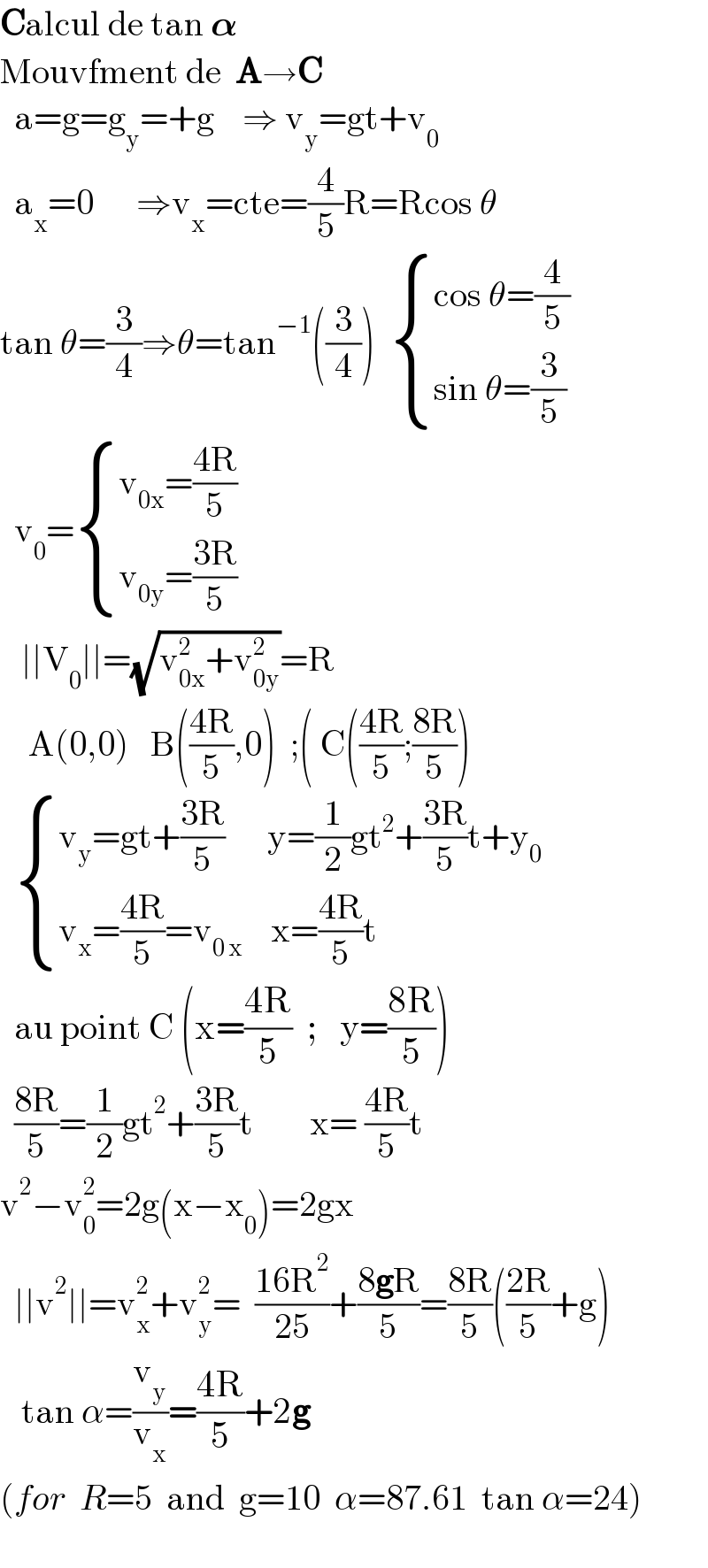
$$\boldsymbol{\mathrm{C}}\mathrm{alcul}\:\mathrm{de}\:\mathrm{tan}\:\boldsymbol{\alpha} \\ $$$$\mathrm{Mouvfment}\:\mathrm{de}\:\:\boldsymbol{\mathrm{A}}\rightarrow\boldsymbol{\mathrm{C}} \\ $$$$\:\:\mathrm{a}=\mathrm{g}=\mathrm{g}_{\mathrm{y}} =+\mathrm{g}\:\:\:\:\Rightarrow\:\mathrm{v}_{\mathrm{y}} =\mathrm{gt}+\mathrm{v}_{\mathrm{0}} \\ $$$$\:\:\mathrm{a}_{\mathrm{x}} =\mathrm{0}\:\:\:\:\:\:\Rightarrow\mathrm{v}_{\mathrm{x}} =\mathrm{cte}=\frac{\mathrm{4}}{\mathrm{5}}\mathrm{R}=\mathrm{Rcos}\:\theta \\ $$$$\mathrm{tan}\:\theta=\frac{\mathrm{3}}{\mathrm{4}}\Rightarrow\theta=\mathrm{tan}^{−\mathrm{1}} \left(\frac{\mathrm{3}}{\mathrm{4}}\right)\:\:\begin{cases}{\mathrm{cos}\:\theta=\frac{\mathrm{4}}{\mathrm{5}}}\\{\mathrm{sin}\:\theta=\frac{\mathrm{3}}{\mathrm{5}}}\end{cases} \\ $$$$\:\:\mathrm{v}_{\mathrm{0}} =\begin{cases}{\mathrm{v}_{\mathrm{0x}} =\frac{\mathrm{4R}}{\mathrm{5}}}\\{\mathrm{v}_{\mathrm{0y}} =\frac{\mathrm{3R}}{\mathrm{5}}}\end{cases} \\ $$$$\:\:\:\mid\mid\mathrm{V}_{\mathrm{0}} \mid\mid=\sqrt{\mathrm{v}_{\mathrm{0x}} ^{\mathrm{2}} +\mathrm{v}_{\mathrm{0y}} ^{\mathrm{2}} }=\mathrm{R} \\ $$$$\:\:\:\:\mathrm{A}\left(\mathrm{0},\mathrm{0}\right)\:\:\:\mathrm{B}\left(\frac{\mathrm{4R}}{\mathrm{5}},\mathrm{0}\right)\:\:;\left(\:\mathrm{C}\left(\frac{\mathrm{4R}}{\mathrm{5}};\frac{\mathrm{8R}}{\mathrm{5}}\right)\right. \\ $$$$\:\:\begin{cases}{\mathrm{v}_{\mathrm{y}} =\mathrm{gt}+\frac{\mathrm{3R}}{\mathrm{5}}\:\:\:\:\:\:\mathrm{y}=\frac{\mathrm{1}}{\mathrm{2}}\mathrm{gt}^{\mathrm{2}} +\frac{\mathrm{3R}}{\mathrm{5}}\mathrm{t}+\mathrm{y}_{\mathrm{0}} }\\{\mathrm{v}_{\mathrm{x}} =\frac{\mathrm{4R}}{\mathrm{5}}=\mathrm{v}_{\mathrm{0}\:\mathrm{x}} \:\:\:\:\mathrm{x}=\frac{\mathrm{4R}}{\mathrm{5}}\mathrm{t}}\end{cases} \\ $$$$\:\:\mathrm{au}\:\mathrm{point}\:\mathrm{C}\:\left(\mathrm{x}=\frac{\mathrm{4R}}{\mathrm{5}}\:\:;\:\:\:\mathrm{y}=\frac{\mathrm{8R}}{\mathrm{5}}\right)\:\: \\ $$$$\:\:\frac{\mathrm{8R}}{\mathrm{5}}=\frac{\mathrm{1}}{\mathrm{2}}\mathrm{gt}^{\mathrm{2}} +\frac{\mathrm{3R}}{\mathrm{5}}\mathrm{t}\:\:\:\:\:\:\:\:\mathrm{x}=\:\frac{\mathrm{4R}}{\mathrm{5}}\mathrm{t} \\ $$$$\mathrm{v}^{\mathrm{2}} −\mathrm{v}_{\mathrm{0}} ^{\mathrm{2}} =\mathrm{2g}\left(\mathrm{x}−\mathrm{x}_{\mathrm{0}} \right)=\mathrm{2gx} \\ $$$$\:\:\mid\mid\mathrm{v}^{\mathrm{2}} \mid\mid=\mathrm{v}_{\mathrm{x}} ^{\mathrm{2}} +\mathrm{v}_{\mathrm{y}} ^{\mathrm{2}} =\:\:\frac{\mathrm{16R}^{\mathrm{2}} }{\mathrm{25}}+\frac{\mathrm{8}\boldsymbol{\mathrm{g}}\mathrm{R}}{\mathrm{5}}=\frac{\mathrm{8R}}{\mathrm{5}}\left(\frac{\mathrm{2R}}{\mathrm{5}}+\mathrm{g}\right) \\ $$$$\:\:\:\mathrm{tan}\:\alpha=\frac{\mathrm{v}_{\mathrm{y}} }{\mathrm{v}_{\mathrm{x}} }=\frac{\mathrm{4R}}{\mathrm{5}}+\mathrm{2}\boldsymbol{\mathrm{g}} \\ $$$$\left({for}\:\:{R}=\mathrm{5}\:\:\mathrm{and}\:\:\mathrm{g}=\mathrm{10}\:\:\alpha=\mathrm{87}.\mathrm{61}\:\:\mathrm{tan}\:\alpha=\mathrm{24}\right) \\ $$$$ \\ $$
Commented by a.lgnaoui last updated on 01/Nov/24
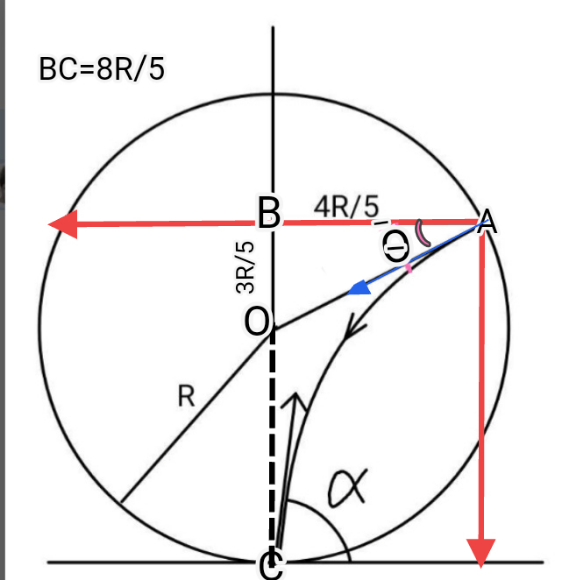
Commented by mr W last updated on 01/Nov/24
![very wrong! tan α has no unit. R has the unit of length [m]. g has the unit of acceleration [m/s^2 ]. tan α=((4R)/5)+2g makes never sense! just like we can not say the angle is equal to the sum from 4 meters and 2 kilograms.](Q213243.png)
$${very}\:{wrong}! \\ $$$$\mathrm{tan}\:\alpha\:{has}\:{no}\:{unit}. \\ $$$${R}\:{has}\:{the}\:{unit}\:{of}\:{length}\:\left[{m}\right]. \\ $$$${g}\:{has}\:{the}\:{unit}\:{of}\:{acceleration}\:\left[{m}/{s}^{\mathrm{2}} \right]. \\ $$$$\mathrm{tan}\:\alpha=\frac{\mathrm{4}{R}}{\mathrm{5}}+\mathrm{2}{g}\:{makes}\:{never}\:{sense}! \\ $$$${just}\:{like}\:{we}\:{can}\:{not}\:{say} \\ $$$${the}\:{angle}\:{is}\:{equal}\:{to}\:{the}\:{sum}\:{from}\: \\ $$$$\mathrm{4}\:{meters}\:{and}\:\mathrm{2}\:{kilograms}. \\ $$
Answered by mr W last updated on 01/Nov/24
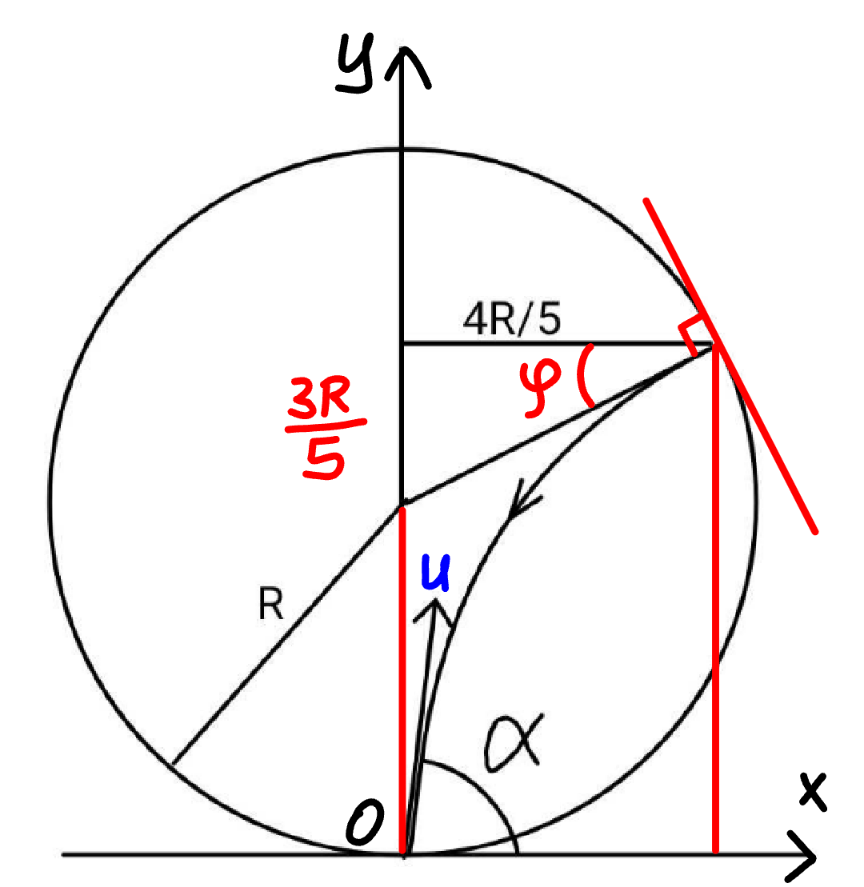
Commented by mr W last updated on 01/Nov/24
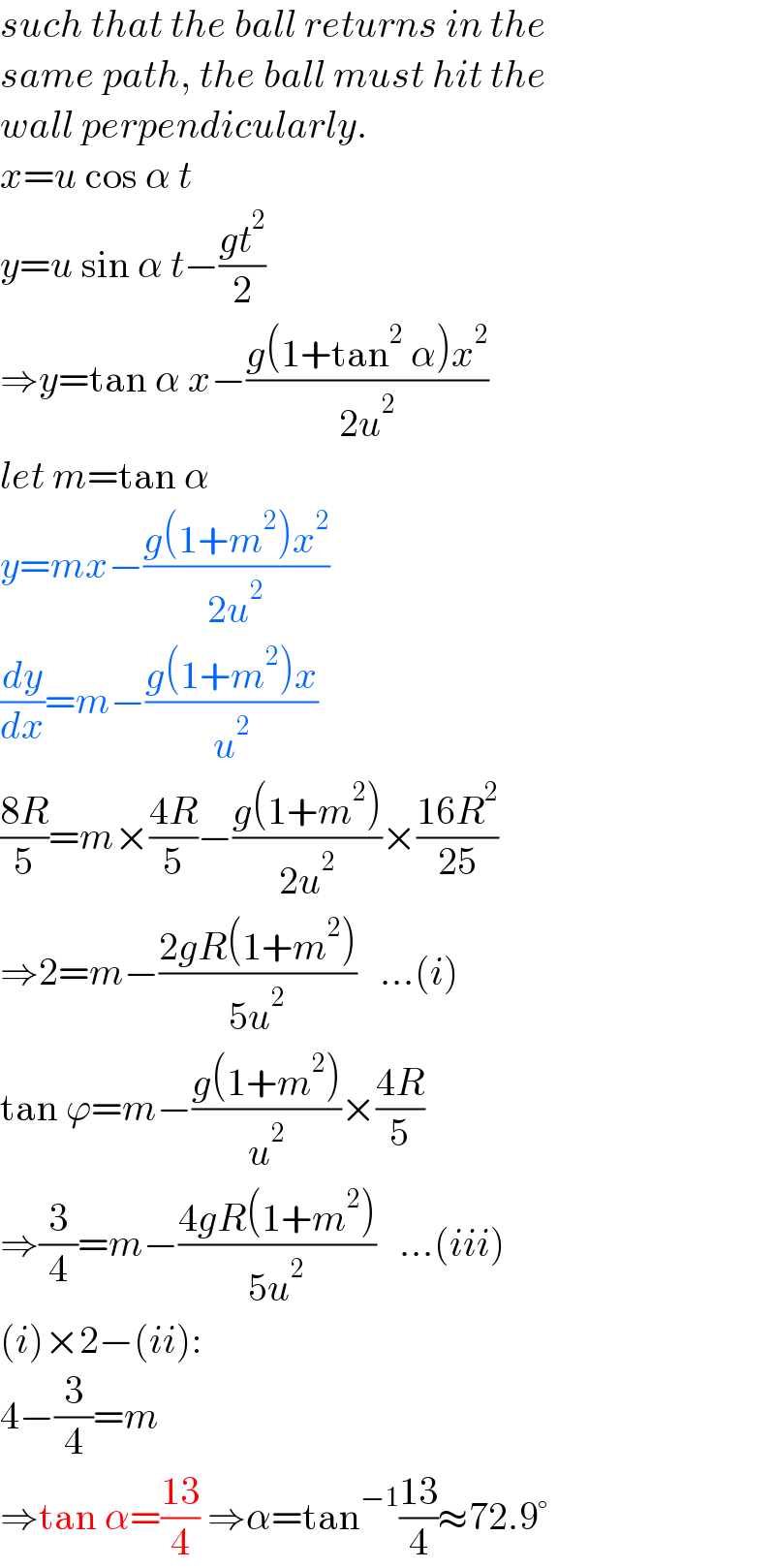
$${such}\:{that}\:{the}\:{ball}\:{returns}\:{in}\:{the} \\ $$$${same}\:{path},\:{the}\:{ball}\:{must}\:{hit}\:{the} \\ $$$${wall}\:{perpendicularly}. \\ $$$${x}={u}\:\mathrm{cos}\:\alpha\:{t} \\ $$$${y}={u}\:\mathrm{sin}\:\alpha\:{t}−\frac{{gt}^{\mathrm{2}} }{\mathrm{2}} \\ $$$$\Rightarrow{y}=\mathrm{tan}\:\alpha\:{x}−\frac{{g}\left(\mathrm{1}+\mathrm{tan}^{\mathrm{2}} \:\alpha\right){x}^{\mathrm{2}} }{\mathrm{2}{u}^{\mathrm{2}} } \\ $$$${let}\:{m}=\mathrm{tan}\:\alpha \\ $$$${y}={mx}−\frac{{g}\left(\mathrm{1}+{m}^{\mathrm{2}} \right){x}^{\mathrm{2}} }{\mathrm{2}{u}^{\mathrm{2}} } \\ $$$$\frac{{dy}}{{dx}}={m}−\frac{{g}\left(\mathrm{1}+{m}^{\mathrm{2}} \right){x}}{{u}^{\mathrm{2}} } \\ $$$$\frac{\mathrm{8}{R}}{\mathrm{5}}={m}×\frac{\mathrm{4}{R}}{\mathrm{5}}−\frac{{g}\left(\mathrm{1}+{m}^{\mathrm{2}} \right)}{\mathrm{2}{u}^{\mathrm{2}} }×\frac{\mathrm{16}{R}^{\mathrm{2}} }{\mathrm{25}} \\ $$$$\Rightarrow\mathrm{2}={m}−\frac{\mathrm{2}{gR}\left(\mathrm{1}+{m}^{\mathrm{2}} \right)}{\mathrm{5}{u}^{\mathrm{2}} }\:\:\:...\left({i}\right) \\ $$$$\mathrm{tan}\:\varphi={m}−\frac{{g}\left(\mathrm{1}+{m}^{\mathrm{2}} \right)}{{u}^{\mathrm{2}} }×\frac{\mathrm{4}{R}}{\mathrm{5}} \\ $$$$\Rightarrow\frac{\mathrm{3}}{\mathrm{4}}={m}−\frac{\mathrm{4}{gR}\left(\mathrm{1}+{m}^{\mathrm{2}} \right)}{\mathrm{5}{u}^{\mathrm{2}} }\:\:\:...\left({iii}\right) \\ $$$$\left({i}\right)×\mathrm{2}−\left({ii}\right): \\ $$$$\mathrm{4}−\frac{\mathrm{3}}{\mathrm{4}}={m} \\ $$$$\Rightarrow\mathrm{tan}\:\alpha=\frac{\mathrm{13}}{\mathrm{4}}\:\Rightarrow\alpha=\mathrm{tan}^{−\mathrm{1}} \frac{\mathrm{13}}{\mathrm{4}}\approx\mathrm{72}.\mathrm{9}° \\ $$
Commented by a.lgnaoui last updated on 01/Nov/24

$$\mathrm{good}\:\mathrm{thank}\:\mathrm{you} \\ $$$$\mathrm{I}\:\mathrm{ask}\:\mathrm{If}\:\:\mathrm{v}_{\mathrm{y}} =\mathrm{v}_{\mathrm{0}} \left(\alpha=\mathrm{60}+\varphi\right)? \\ $$
Commented by mr W last updated on 01/Nov/24

$${no}. \\ $$
Commented by ajfour last updated on 01/Nov/24
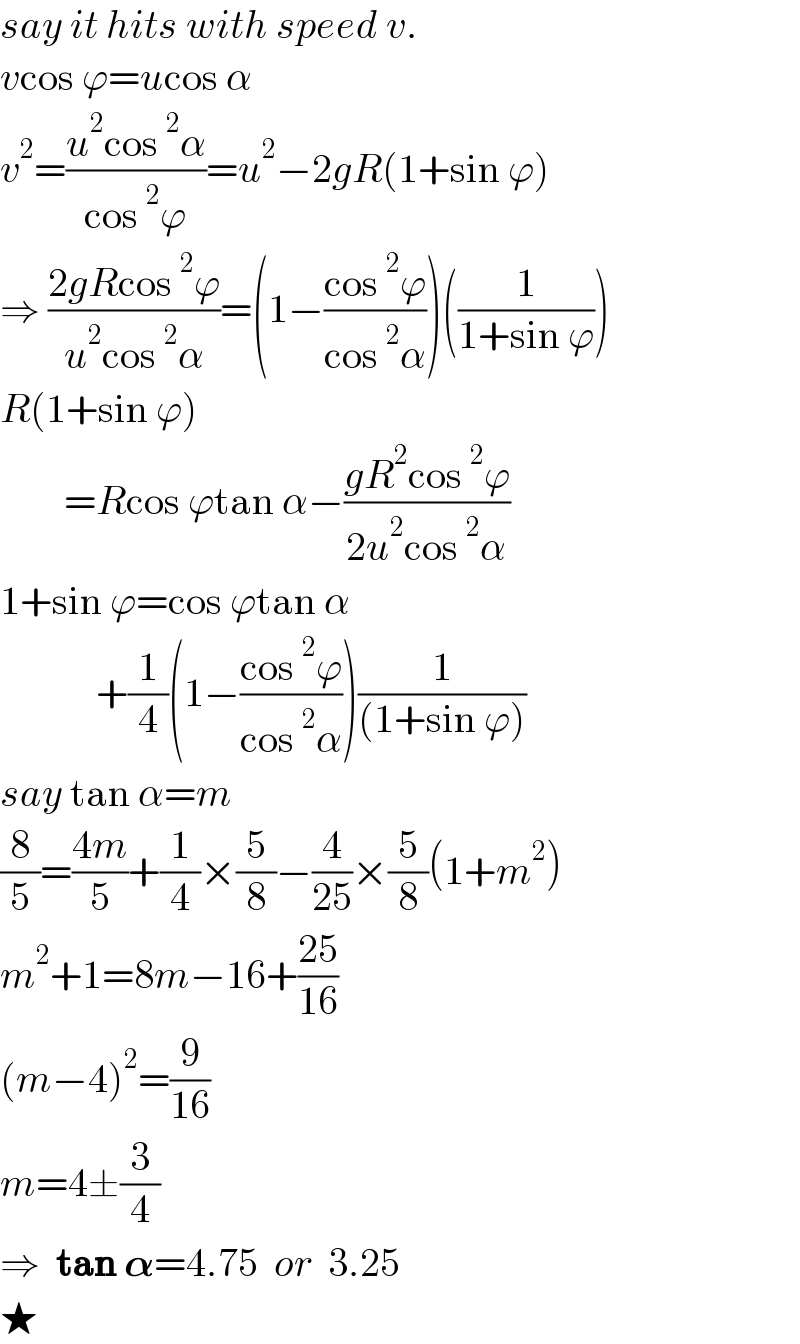
$${say}\:{it}\:{hits}\:{with}\:{speed}\:{v}. \\ $$$${v}\mathrm{cos}\:\varphi={u}\mathrm{cos}\:\alpha \\ $$$${v}^{\mathrm{2}} =\frac{{u}^{\mathrm{2}} \mathrm{cos}\:^{\mathrm{2}} \alpha}{\mathrm{cos}\:^{\mathrm{2}} \varphi}={u}^{\mathrm{2}} −\mathrm{2}{gR}\left(\mathrm{1}+\mathrm{sin}\:\varphi\right) \\ $$$$\Rightarrow\:\frac{\mathrm{2}{gR}\mathrm{cos}\:^{\mathrm{2}} \varphi}{{u}^{\mathrm{2}} \mathrm{cos}\:^{\mathrm{2}} \alpha}=\left(\mathrm{1}−\frac{\mathrm{cos}\:^{\mathrm{2}} \varphi}{\mathrm{cos}\:^{\mathrm{2}} \alpha}\right)\left(\frac{\mathrm{1}}{\mathrm{1}+\mathrm{sin}\:\varphi}\right) \\ $$$${R}\left(\mathrm{1}+\mathrm{sin}\:\varphi\right) \\ $$$$\:\:\:\:\:\:\:\:={R}\mathrm{cos}\:\varphi\mathrm{tan}\:\alpha−\frac{{gR}^{\mathrm{2}} \mathrm{cos}\:^{\mathrm{2}} \varphi}{\mathrm{2}{u}^{\mathrm{2}} \mathrm{cos}\:^{\mathrm{2}} \alpha} \\ $$$$\mathrm{1}+\mathrm{sin}\:\varphi=\mathrm{cos}\:\varphi\mathrm{tan}\:\alpha \\ $$$$\:\:\:\:\:\:\:\:\:\:\:\:+\frac{\mathrm{1}}{\mathrm{4}}\left(\mathrm{1}−\frac{\mathrm{cos}\:^{\mathrm{2}} \varphi}{\mathrm{cos}\:^{\mathrm{2}} \alpha}\right)\frac{\mathrm{1}}{\left(\mathrm{1}+\mathrm{sin}\:\varphi\right)} \\ $$$${say}\:\mathrm{tan}\:\alpha={m} \\ $$$$\frac{\mathrm{8}}{\mathrm{5}}=\frac{\mathrm{4}{m}}{\mathrm{5}}+\frac{\mathrm{1}}{\mathrm{4}}×\frac{\mathrm{5}}{\mathrm{8}}−\frac{\mathrm{4}}{\mathrm{25}}×\frac{\mathrm{5}}{\mathrm{8}}\left(\mathrm{1}+{m}^{\mathrm{2}} \right) \\ $$$${m}^{\mathrm{2}} +\mathrm{1}=\mathrm{8}{m}−\mathrm{16}+\frac{\mathrm{25}}{\mathrm{16}} \\ $$$$\left({m}−\mathrm{4}\right)^{\mathrm{2}} =\frac{\mathrm{9}}{\mathrm{16}} \\ $$$${m}=\mathrm{4}\pm\frac{\mathrm{3}}{\mathrm{4}} \\ $$$$\Rightarrow\:\:\boldsymbol{\mathrm{tan}}\:\boldsymbol{\alpha}=\mathrm{4}.\mathrm{75}\:\:{or}\:\:\mathrm{3}.\mathrm{25} \\ $$$$\bigstar \\ $$
Commented by ajfour last updated on 01/Nov/24

$${Thank}\:{you}\:{mrW}\:{sir},\:{I}\:{got}\:{two} \\ $$$${answers},\:{both}\:{i}\:{hope}\:{are}\:{correct}; \\ $$$${one}\:{is}\:{same}\:{as}\:{yours}. \\ $$
Commented by Ghisom last updated on 01/Nov/24

$$\mathrm{tan}\:\alpha\:=\mathrm{4}.\mathrm{75}\:\mathrm{is}\:\mathrm{wrong} \\ $$$$\mathrm{you}\:\mathrm{squared}\:\mathrm{in}\:\mathrm{line}\:\mathrm{2}\:\left({v}^{\mathrm{2}} =...\right)\:\mathrm{thus}\:\mathrm{introducing} \\ $$$$\mathrm{this}\:\mathrm{false}\:\mathrm{solution} \\ $$
Commented by mr W last updated on 01/Nov/24

$${only}\:{with}\:{m}=\frac{\mathrm{13}}{\mathrm{4}}\:{the}\:{ball}\:{returns}\:{back} \\ $$$${following}\:{the}\:{same}\:{path},\:{the}\:{green}\: \\ $$$${path}. \\ $$
Commented by mr W last updated on 01/Nov/24
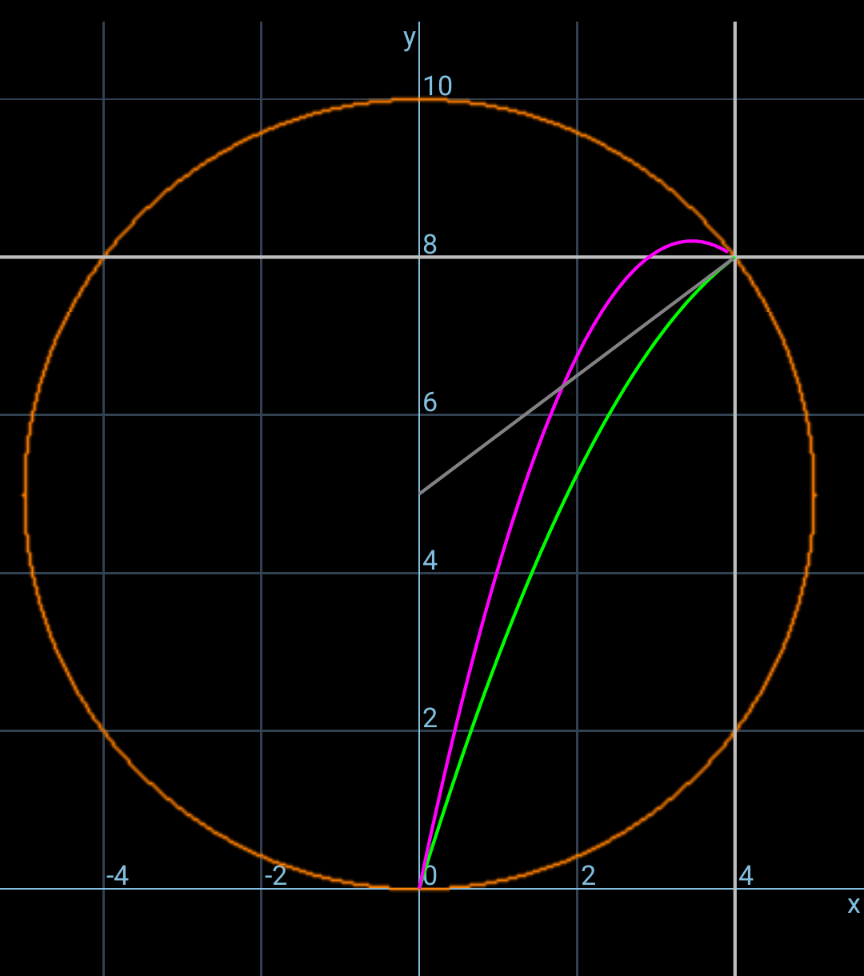
Commented by ajfour last updated on 02/Nov/24

$${yes},\:{thank}\:{you};\:{so}\:{it}\:{indeed}\:{seems}. \\ $$
